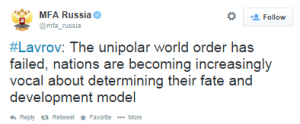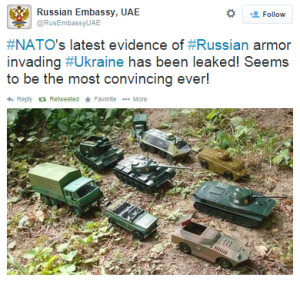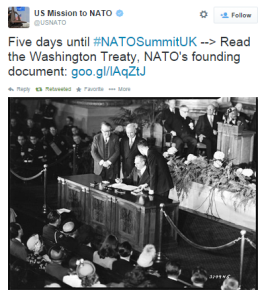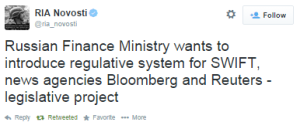Round up of week ending: 5th September 2014
—
Articles: Federal Network News 20140829
Executive Summary
Stories / Themes which dominated
i) Islamism vs. Nationalism in the Middle East, North Africa and India
ii) Russia’s expansionism: The now acknowledged Russian-Ukraine War and NATO
iii) The economic effects of Russian counter-sanctions (import bans) on Europe
iv) The continuing emergence of UKIP in the UK
v) Changing of guard in Europe: Mogherini and Tusk brought into the ranks
Check out the paper sections for more details on the following:
– Russia’s Quiet Submarine provocations, and Japan.
– Attacks on Belarus and Ukraines free media
– Saudi Arabia’s plan to relocate the prophet and destroy the shrine at Medina
– How a botched Saudi Secret oil deal may have given Russia an advantage in Syria
– al-Shabaab – and what the US is doing about them.
– and More !
Summary and Commentary
World
Articles
Islamism vs. Nationalism in the Middle East, North Africa and India
Islamic State continued to make headlines
Brooking Doha suggested that elements of al-Nusra have loyalty to IS. This is unexpected and indicates that IS may have an extensive network already established in the south of Syria. Given the recent up-tick in accidental (stressed as such by IDF sources) weapons fire crossing into Israel’s territory in Golan, this could add a decisively more dangerous twist to Israel’s current security issues as experienced with Palestine.
Most importantly, this demonstrates use of sophisticated infiltration strategies which have big implications for Lebanon and other countries in the region.
The US / UK appear to be preparing for air strikes against the Islamic State in apparent retaliation for videos posted on-line depicting the beheading of Western hostages.
Arguments against such a move have been put forward by both in the intelligence press, and middle eastern media. The case against is that such a bombing campaign will make IS stronger – partly due to the blitzkrieg effect on public opinion – but it is also pointed out that 20 years of Western bombing has been a major factor in creating the Islamic State organization that is seen today so may not be a valid approach if the intention is to defeat or pacify the organisation.
Intelligence media has also raised the point that the executions are designed to ‘goad‘ the West into action, which seems to be the objective of some sections of the media. Whilst the effect on public opinion has been mixed, the notion that a deliberately provocative strategy against the West in order stimulate military action to enhance local support for IS is wholly credible.
The fact that Islamic State is acting as an actual State in North East Syria has been reported, the irony is that President Obama’s characterisation of IS as being a ‘JV Team’, disputed since reported by the New Yorker earlier this year, was also confirmed.
Some Key questions perhaps for IS:
i) How autonomous is IS in reality ?
ii) Can they take the next step as a government and start issuing passports ?
The second point would fix a lot of security problems in Europe and beyond. If IS were to start issuing such travel documents, home States can then safely revoke citizenship of jihadis without running the risk of making folk Stateless and/or contravening international / constitutional law. Islamic State already encourage the burning of passports.
The ‘enemy’s enemy is also my own enemy’ has been put forward and ruled out as a line of reasoning for the West to support Assad’s government with airstrikes. There is a strong case that much of IS in Syria today is similar to that of the GIA campaign in Algeria in the 90s.
It is also becoming clearer that IS are deploying a Russian style active measure campaign against Lebanon to destabilize the government through agitation. This is presumably part of the planning for taking the country once they have consolidated their control of Syria’s surrounding provinces.
The twisted logic of IS’s chosen symbolism was revealed also in Lebanon this week, when flag burners were ordered to face trial. The IS flag is a Shahada flag.
In a strange move the BBC did decide to edit out of their daily front page press presentation the name of the english hostage who IS stated they will execute next: An apparent FCO / family request and not a DA-Notice. The hostages Croatian connection is notable.
Clerics in Kerala, India, and the UK have issued fatwas against Islamic State.
Turkey is drawn itself into the limelight with Turkey’s Prime Minister Ahmet Davutoğlu’s pan-Islamist thesis being revealed. Turkey has been quietly instrumental in the support of IS, however, that relationship may be under strain now since the Kirkuk-Ceyhan pipeline was shut down by an IS attack. Repair time is estimated in years.
The Ottoman sentiments expressed have a poor omen evidenced by the collapse of an Ottoman palace in Benghazi.
– Libya
In further ’embarrassment’ for the US (and to a degree the UK) Islamist militia forces captured and razed the airport in Tripoli, forced the Libyan government to resign, and had a well publicised pool party at the US Benghazi Embassy compound, scene of the controversial murder of Ambassador Stevens in 2012.
UK Ambassadors were in Libya this week also in an attempt to either figure out who was running the country, or discuss with those who claim to be, amid a backdrop of strange UAE / Egyptian military interventions and rocket attacks on roads leading to Tunisia. The EU had to abandon its mission maintaining border security between Libya and Tunisia due to the deteriorating situation.
Russia’s position is that Libya is current in a state of ‘free fall‘.
The negative political implications for Hilary Clinton’s Presidential are likely to be minimal.
The chaos in the country has some how not adversely affected oil exports at present, but the risks presented to ports, oil and gas terminals are steadily increasing. The gas issue is particularly important for Italy.
The Indian government notably made moves this week to get their nationals out of Libya.
– Lebanon
Lebanon is firmly in IS’s cross hairs now.
The Lebanese army has determined that it needs to increase it’s air capabilities in order to tackle IS on the ground, but this does not address what appears to be an active measures which IS are executing against Lebanon, nor detail where Lebanon would receive intelligence to identify suitable targets for hellfire deployments. Cessna Caravan’s would be very easy pickings for a jihadist equipped with a MANPAD. Such intelligence sharing would be straightforward were it not for the presence of Hezbollah, and of course, Iranian intelligence.
It is credible to suggest that IS have intentionally allowed refugee flows to head into the country in order to destabilise the government on the one hand, and to make their more ‘genocidal’ activities against non-Abrahamic religious followers easier to manage on the other.
– India
Al-Qaeda’s Zawahiri calls on the Umma to restore caliphate in India as he declares a new branch of AQ open for business. This has put India into a state of high alert, but as most are aware that Al Qaeda was originally set up in part by Pakistan’s ISI, the credibility is thin. However, the threat that pan-Islamist ideas pose to the Indian government cannot be discounted so lightly.
Such pre-occupations are not new, the British had similar worries after the assassination of Mayo but understood perfectly that they could not penalize Muslim’s in the country without incurring the displeasure of the Caliph.
Changing of guard in Europe: Mogherini and Tusk brought into the ranks
Italy’s Federica Mogherini was assigned to the position of High Representative of the Union for Foreign Affairs and Security Policy, replacing Baronness Ashton. Mogherini’s appointment has been criticised on the basis that she has little experience of dealing with Russia in the media, which has ignored that she has expert knowledge in the field of Islamic Politics.
Poland’s Donald Tusk has been appointed President of the European Council replacing Herman von Rompuy.
The continuing emergence of UKIP in the UK
New papers cabinet office papers release in the UK have confirmed that Harold Wilson was warned of the dangers to UK sovereignty that membership of the European Community presented, and that these were intentionally excluded from the propaganda published for the 1975 referendum on membership. Whilst such revelations are of no surprise, this further undermines the consensus legitimacy of the UK’s membership of what became the European Union.
Problems involving border control, the European Arrest Warrant mechanism and ECHR Article 10 were highlighted this week also.
- EAW
The EAW received negative publicity after being used against the family of Aysha King in response to an emergency protection order being issued by the UK hospital the child was being treated at. The incident highlights very clearly dysfunction within UK institutions from hospital to the justice system in sensibly using these powerful tools of State. Whether this was done to ‘socialise’ or ‘stigmatise’ the EAW and emergent Federal justice system is open to debate. The effect in the UK was profoundly negative, in part forcing the decisions to separate child from parents to be reversed. This has perhaps helped UKIP gain further political support. UKIP have been quite vocal in warning of the dangers that mis-use of the EAW present to all European citizens. It should be noted that the European Commission have also issued such warnings about misuse to member State governments. - Border Control
The attempted storming of a passenger ferry by illegal migrants in Calais, France, in what can be described as an attempted ‘invasion’ of the UK (repelled only with fire-hoses by ferry staff), speaks to the more traditional dysfunction that has been evident between EUCO and member States. - ECHR Article 10
The UK Metropolitan police intercepting of The Sun’s political editor Tom Newton Dunn’s mobile phone in order to identify leak sources within their own ranks made mockery of the Article 10 ECHR provisions for journalists to protect their sources. This does raise further questions as to how member State institutions regard the ECHR Articles and protections, as well as their attitude towards citizens generally.
An independent report revealing the sexual abuse of ~1400 children in Rotherham between 1997 and 2013 caused some agitation, mostly political. Given the politically motivated incident involving foster care children in a family which supported UKIP during the 2012 by-election this has resonated with UKIP supporters. It has also resonated with more extreme party supporters, in particular the EDL and BNP.
An EDL member in Durham was reported to have had a newborn child taken away at birth due on the basis of her political affiliation in 2012, the BNP were trying to raise awareness of the situation in Rotherham back in 2010. Their discrediting by Labour during the 2010 election campaign pushed the issue away until it resurfaced with the UKIP incident. It should be noted that political correctness as practised in the UK enabled and supported this situation. The reader is left to drawn their own conclusion as to why, however, unintended consequence reasoning is respectfully suggested to be discounted – Political outcomes are always planned.
One is minded that both Angela Merkel (2010) and David Cameron (2011) have both stated that multi-culturalism has failed. The grounds that political affiliation with EDL / UKIP would expose children to political radicalization hence should be taken into care becomes questionable when one considers images such as that displayed on the front of the Daily Star, and the numbers of young UK Muslims who are travelling to fight jihad abroad.
Tory MP Douglas Carswell resigned his seat in Clacton after defecting to UKIP and has triggered a by-election scheduled for the 9th of October. Party leader Nigel Farage has been covering the US talkshow circuits, notably in a very positive interview with Hannity, and has also been in meeting with News Corp’s CEO Rupert Murdoch.
Politics
Articles
Russia’s expansionism: The now acknowledged Russian-Ukraine War and NATO
The Russian Ukraine war has been formally acknowledged by the West now that UN Resolution 3314 language describing Russia’s actions in east Ukraine is now used. The opening of a new front in the South East corner away from the main cities of Donetsk and Lugansk, indicate Russia’s intent to establish a Land Bridge between Russia and Crimea before winter – and upcoming troop rotations – arrive. The city of Mariupol has experienced GRAD shelling this week.
Putin’s meeting at the beginning of the week in Seliger with the National Youth Forum revealed the nationalist narrative that is being presented to Russia’s youth, and also revealed concerns notably from Kazakstan about Russia’s approach in Ukraine.
The jumper worn by Putin received vocal, if maybe faint, praise.
An important point was raised by one agricultural student who asked what the government was doing to ensure food security. Putin’s response that he would direct departments to look into this immediately appears to have been acted on. Much has been reported on Russian food sources since eg:
– Belarus Cheese
– Increase Domestic Production
– Alternative markets open
– Poll indicating certain domestic products better quality than imports
– No sharp price rises in Russia
– EU planning to lodge WTO complaint
– Canadian Loss
The added coverage is presumably to reassure the Russian public, and scold countries which Russia feel may only have weak political support for the sanctions. The reassurance does seem to be very reassuring.
The issue of dead troops has become a new propaganda front for activists within and without Russia for attacking the ‘Special‘ or ‘Hybrid‘ War which Putin has started against Ukraine. This has seen charities in St Petersburg dedicated to supporting the mothers of dead Russian soldiers being classified as ‘Foreign Agents’. The dead soldiers issue is sensitive in Russia as in order to prosecute this war the government has had to undermine Russian constitutional law – a process which started with the original Crimea annexation – officially termed by Russia as ‘protection’.
Claims that dead VVP paratroopers are being disrespectfully buried in unmarked graves, reporters within Russia who have attempted to report on this issue have been subject to harassment starting with slashed car tires.
Russia announced the formation of so called ‘antimaydannyh‘ squads to protect political order. These will be created in all regions of Russia, small teams with a specific brief attached to the local police forces.
Propaganda has not been altogether against Russia either: Russian sources confirmed that missing photographer Andrei Stenin was killed in early August. His body was identified among remains found in a burned out car – The open casket funeral was publicized movingly on Ruptly on the September 5th.
Polls have been important in Russia this week. In particular a Levada poll on the issue of the Beslan hostage crisis of 2004 was revealing:
42%: Authorities told only part truth 62%: Authorities did all they could to save hostages
Social media has seen some interesting coverage with both Russian Embassies and NATO engaging in what appears to be a form of overt information warfare.
The tone from Russia’s FM has been more blunt:
The logical question is whether the West is in tacit agreement that a restoration of multi-polar order is desirable, and more importantly, despite decrying unipolar world order does Russia intend to practice what it preaches ? It is credible to suggest that they perhaps seek to replace the existing unipolar order with one more to their liking rather than seeking restoration of a multi-polar order.
In Crimea, Interfax reported that Arksenov stated that ‘Sexual minorities are not needed’
Domestically, Putin has started to address the restive Siberia problem more robustly. It was announced that government functions of Moscow are to be split between Moscow and Krasnoyarsk. The policy of relocating Ukrainian refugees to restive areas in order to water down dissent continues.
Minsk Peace
The meeting in Minsk at the beginning of the week resulted in an announced peace plan and ceasefire which pro-Russian forces apparently did not respect and Poroshenko was put in a humilating position to retract.
Whilst this was a failure of diplomacy it could also be regarded as a failed attempt by Russia to undermine Poroshenko’s authority domestically, and credibility internationally.
The European line also hardened. Merkel has stated in Berlin on the 1st September:
‘Accepting Russia’s behaviour is not an option. And therefore it was necessary to prepare further sanctions.’
Mogherini, in Corriere d’ella Sera on the same day stated: ‘At the moment, the K’remlin is acting against the interests of its people.’
Reports that Russian forces have stormed Lugansk airport today – Russia will need this base in order to launch air strikes in the region. Ukraine forces have tactically retreated after destroying a large amount of Russian armour.
DNR / LNR are trying to approach Kiev with a negotiated peace deal – that would constitute P’utin’s frozen conflict strategy.
Russia’s embassy in the UAE questioned the authenticity of NATO satellite imagery:
NATO channels have been calmly reminding folk about the sacred nature of Article V and the founding Washington Treaty:
The NATO meeting in Wales this week was foreshadowed by a straight warning to Russia from the US on the Baltics which essentially read: ‘Don’t even think about it’. US President Barrack Obama made a well received visit to Estonia to demonstrate express and demonstrate the seriousness of the alliances commitment to those countries.
This comes against a backdrop of strange divisive rhetoric about two tier NATO. German Chancellor Angela Merkel apparently ruled that permanent bases are not an option for eastern Europe, which earned stern criticism from Lithuania’s PM.
Croatia has perhaps help set a foundation under the issue of NATO funding by member States when they announced intention to peg their defence spending at 1.2% of GDP over the next 10 years, 0.8% below the 2% which was agreed (but non-binding) in the early 2000’s. The 1.2% is a middle figure.
The changing tone in Washington towards the IS problem in Iraq – advocating that regional powers take responsibility, coincides with a changing tone towards NATO alliance members that do not contribute adequately. There is no suggestion yet that this places the objectives of the alliance at risk, but should be a clear wake up call that the political will of the US to subsidise European defence costs in particular is transitioning.
(The admission that the US itself does not have a strategy for comprehensively dealing with Islamic State is of separate concern.)
Tit-For-Tat propaganda has been slowly ratcheting up in both the Western and Russian media this week. Russian outlets in particular have been pushed into a position of needing to exclude reasoning, such as in how they presented NATO’s plan to establish 5 permanent bases in Eastern Europe – ie. This is because Russia is officially considered ‘global enemy #1 by NATO now’.
However, Russia has responded by describing NATO as their ‘real enemy’ with Klintsevich advocating a modification to Russian nuclear doctrine which would prescribe first strike measures to be brought against NATO specifically. This is against a backdrop of steadily increasing threating nuclear rhetoric, founded on a doctrine which for a while has advocated the use of non-conventional weapons in non-retaliatory situations.
Putin looks to be trying a last ditch political solution to wind this up quickly and ‘freeze’ the conflict:
Putin also announced that draw downs from Russia’s National Wealth Fund would be capped at $83bn, however, the Russian government remains open to lobbying for ideas which create new territories for development. Rosneft have already tapped the NWF for $40bn of funding claimed needed due to the effects of Western sanctions, curious as Russia also announced this week that oil production would be reduced by 40k bbl’s / day.
Barroso and Putin discussed peace strategy in a long and controversially reported conversation which led to La Repubblica reporting the following quote from Putin said to Barroso: ‘If I want, I take Kiev in two weeks.’
Moscow has strongly objected to this being released on the grounds that it was taken out of context and that it is bad diplomatic practice. In context of the previously leaked phone conversations between Commissioner Ashton and the Estonian FM, and also the Victoria Nugent EU incident courtesy of Russia, the complaints perhaps can be read as hypocritical if not outright ironic.
The Russian Aid Convoy has returned to the border of Eastern Ukraine, however without Kiev’s knowledge. News emerged this week that other than transporting dead soldiers out, the previous aid convoy was used to loot engineering plant from factories in east Ukraine – in particular plant used to manufacture turbo fan parts for engines.
New members joining the alliance was ruled out for this summit, but the US indicated it may grant Ukraine the status of ‘special ally‘. This included Ukraine, however a €15m trust fund to assist Ukraine military in its defence against Russian aggression was announced by NATO, as was strong expression that NATO stands with Ukraine.
Cold Star Wars ?
The long running saga of Russia’s space gecko’s came to a sad end this week. The satellite carrying them returned safely, but the gecko’s themselves were found to have died of extreme hypothermia: The life support system had failed causing them to freeze to death.
At present there are no plans to send more gecko’s into space.
See the paper for more details, and video with full background in links.
Business
Articles
Russia has started to make a moves to reclaim assets connected with Berezovsky, notably mansions in France. Russia has also questioned the UK’s assertion that Berezovsky was bankrupt when he died. Regarding Switzerland, Moscow regards its mirroring of US/EU steps as being unfreindly towards Russia, Russian Capital will be leaving.
Following a reformation of the French cabinet, France’s Mistral contracts have been under scrutiny again with France stating that it will suspend delivery of the ships as ‘conditions are not right’. Russia has responded with a mix of denial that such a move has happened through to pointed questioning of France’s reliability as a contract partner, invoking the ghost of de Gaulle in hinting that a decision not to supply Russia has been orchestrated by the US.
France’s Ricardo-Pernod has increased exports of Absolut Vodka to Russia in a move to shore up sales before an import ban is imposed. Ricardo may be banned as Russia’s key ally Cuba’s trademark case on Havana Club Rum suffered set backs in the US this week.
Cuba’s Fidel Castro made some announcements stated this week that Western economic politics are leading to the dollar and euro becoming dependent on the Ruble: No further economic argument was given to support this case. Castro and Maduro also stated that both Cuba and Venezuela have stood up for Russia.
In response to the deflationary effects of Russia’s counter-sanction measures (food import ban) the ECB has cut rates sharply in a surprise move. The move and the media’s willingness to inform rightly that it is to defend against deflation is bold. This may not have the intended effect. Croatia is eyeing managed defaults – debt-write offs) following the lead of Macedonia.
Russia for its part has been talking about exiting the Western international system period, and setting up its own:
Whilst there have been suggestions to ban Russian from using SWIFT, in a bid to interrupt their means of settling international payments and disrupt the banking system, that would put the West at a significant disadvantage as it would free Russia to conduct hostile attacks against the SWIFT infrastructure, and also deny the West the ability to track SWIFT payments – an important source of raw intelligence. Russia may be considering a plan B through the BRICS bank entity.
Tackling the impact will pose problems for Europe which will likely not see production quota reductions accepted peacefully. The news that Spain has received warning of planned unrest will not help matters.
Back to the Future ?
ITAR-TASS celebrated it’s 110th Birthday this week and has rebranded itself back to the more familiar and punchier: TASS.
Environment
Articles
Some intersting developments in religious news this week.
India saw a young lady in one of its less developed villages being proudly married to a dog in a bid to ward off an evil spirit.
Gallup poll’s are indicating that the importance of religion in daily life is growing outside the West, and there are indications that this correlates with reported positive perceptions of the quality of life.
The plight of Christians in Syria and Iraq at the hands of Islamic State has also received attention. In Lebanon, the Sunni Dar al-Fatwa have been assisting refugee’s from the conflict demonstrating Islam’s more tolerant face.
The Pope has also spoken out on behalf of Christian’s in Iraq describing them as ‘The heart of the Church‘. Maronite Bishops also spoke out on the issue of IS contradicting Islam – a statement understandable as their followers have been targetted by the group, but which does not stand up to closer analysis. The desires expressed by a misguided UK female jihadist are most decidedly un-Islamic.
Patriarchs in Ukraine have also started to address the problem of propaganda issued by Moscow’s Kirill suggesting they have been waging holy war against Greek Orthodoxy in East Ukraine by writing to Constantinople. Greek Orthodox churches have been targeted in east Ukraine, as the Ukrainian Orthodox Church itself has.
Technology
Articles
Arts & Entertainment
Articles





